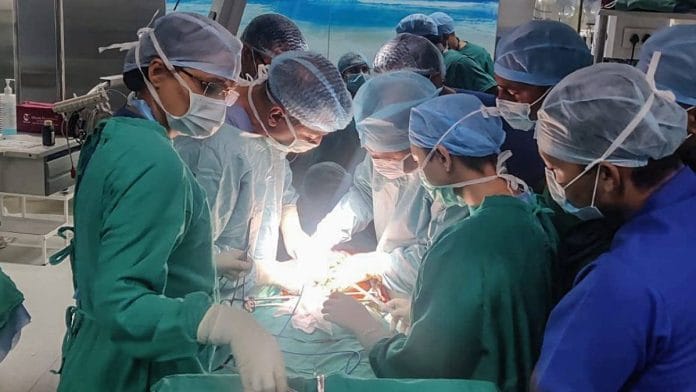New Delhi: As the Bhartiya Nyaya Sanhita (BNS) replaced the Indian Penal Code (IPC) this month, the central government clarified Tuesday that punishment for doctors proven guilty of causing death by negligence remains the same as earlier (imprisonment for two years).
After this announcement, the Indian Medical Association (IMA), the largest network of doctors in the country, called for a nationwide campaign against “criminal prosecution of doctors”.
The clarification by the Union Ministry of Health and Family Welfare, however, has done little to calm down medical professionals who point out that under the IPC, punishment for death due to negligence by doctors entailed either financial penalty or imprisonment, but under the new law, jail term is mandatory if doctors are proven guilty of medical negligence.
“The new law is harsher for doctors. It guarantees jail term for doctors if they are proven guilty of medical negligence. This will not only affect doctors but also have a profound effect on patient’s well-being and doctor-patient relationship,” Dr K.V. Babu, an ophthalmologist from Kerala, told ThePrint.
In its statement, the government pointed out that Section 106(1) of the BNS states that death by negligence caused by a registered medical practitioner while performing a medical procedure shall be punishable for two years with a fine. “It is clarified that causing death by negligence by any person (including medical practitioners) was punishable with imprisonment up to 2 years or fine under section 304A of the IPC,” it said.
IMA president Dr R.V. Asokan told ThePrint that a change in conjunction — an “or” replaced by “and” — could be a clerical error but has widespread ramifications. “This comes despite repeated demands by IMA for exemption from criminal proceedings in the BNS,” he said.
‘Surgeons could be most impacted’
In 2022, the IMA had written to Prime Minister Narendra Modi requesting that doctors be exempted from criminal proceedings in the BNS, which was being drafted at that time.
The association had also sent its suggestion to the government in November 2023, when the draft BNS bill was released for public feedback.
In its letter, the IMA said that the concept of mens rea (state of mind implying criminal intent) has to be applied in letter and spirit for any duly qualified and registered medical practitioner. Mens rea, along with actus reus (the actual act), constitute the two essential elements of a criminal offence.
“Absence of mens rea in a case of a medical mishap or accident is too evident to be ignored,” IMA wrote to the prime minister, urging for a “safe and amiable atmosphere” for doctors to practise their profession “without fear of criminal prosecution”.
The previous version of the BNS bill proposed five years of imprisonment for doctors convicted of death by negligence, but in the final law, the government reduced the duration to two years.
“Despite our requests, the result is a harsher provision for doctors,” a doctor associated with the Delhi Medical Council told ThePrint, adding that under the IPC, medical negligence cases were handled through compensation or professional disciplinary actions, and not criminal charges.
“But the new law specifically targets medical practitioners. This has made us jittery that doctors will increasingly incline towards defensive medicine and risk aversion,” he said.
A surgeon associated with a central government-run hospital in the Capital told ThePrint that this could lead to unnecessary tests, higher costs, and doctors avoiding high-risk patients, harming patient care. “Smaller hospitals might avoid high-risk procedures, like C-sections, leading to more referrals to larger centres. The ones most impacted due to the new law will be surgeons dealing in complicated cases,” the surgeon said.
In a letter sent Monday to its state units calling for a nationwide stir, the IMA said that “mindless criminal prosecution has resulted in harassment of doctors and practice of defensive medicine”.
“There is a legitimate case for exempting the professional service of doctors from criminal prosecution. It is the responsibility of the government to provide a safe and amiable atmosphere for doctors to practice their profession without fear of criminal prosecution,” the association wrote.
It asserted that the criminal liability of medical negligence is of controversial legality.
Application of Section 26 of BNS
In its latest demand, the IMA has said that Section 26 of BNS should be applied in cases of alleged criminal negligence.
According to this section, “Nothing, which is not intended to cause death, is an offence by reason of any harm which it may cause, or be intended by the doer to cause, or be known by the doer to be likely to cause, to any person for whose benefit it is done in good faith, and who has given a consent, whether express or implied, to suffer that harm, or to take the risk of that harm.”
The ’ association has illustrated it stating that “A, a surgeon, knowing that a particular operation is likely to cause the death of Z, who suffers under the painful complaint but not intending to cause Z’s death and intending in good faith, Z’s benefit, performs that operation on Z, with Z’s consent, (in such a case) A has committed no offence”.
Asokan pointed out to ThePrint that the Supreme Court had previously advised caution in prosecuting medical practitioners to avoid unnecessary harassment.
“In fact there have also been suggestions of involving medical boards in the process before registering FIRs against doctors to ensure fair evaluation,” he said.
(Edited by Radifah Kabir)
Also read: Zika crisis grows but India lags on tests that are widely available, surveillance






